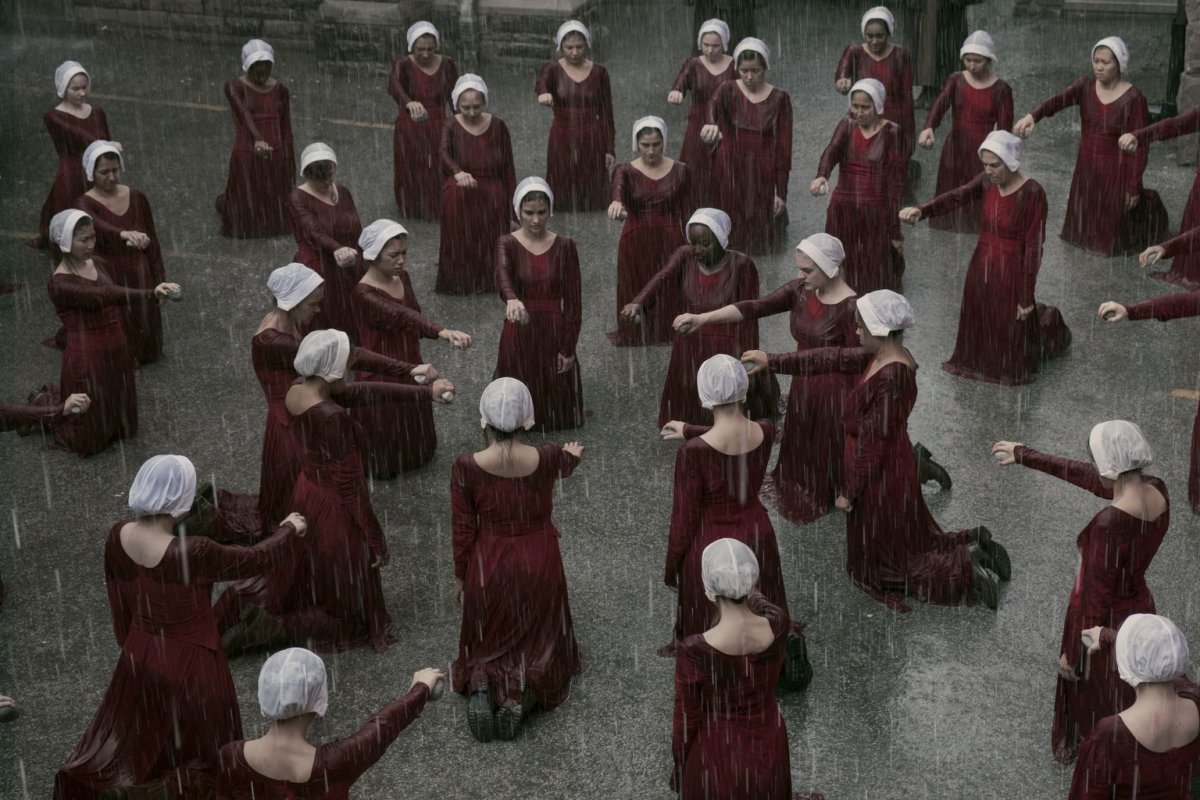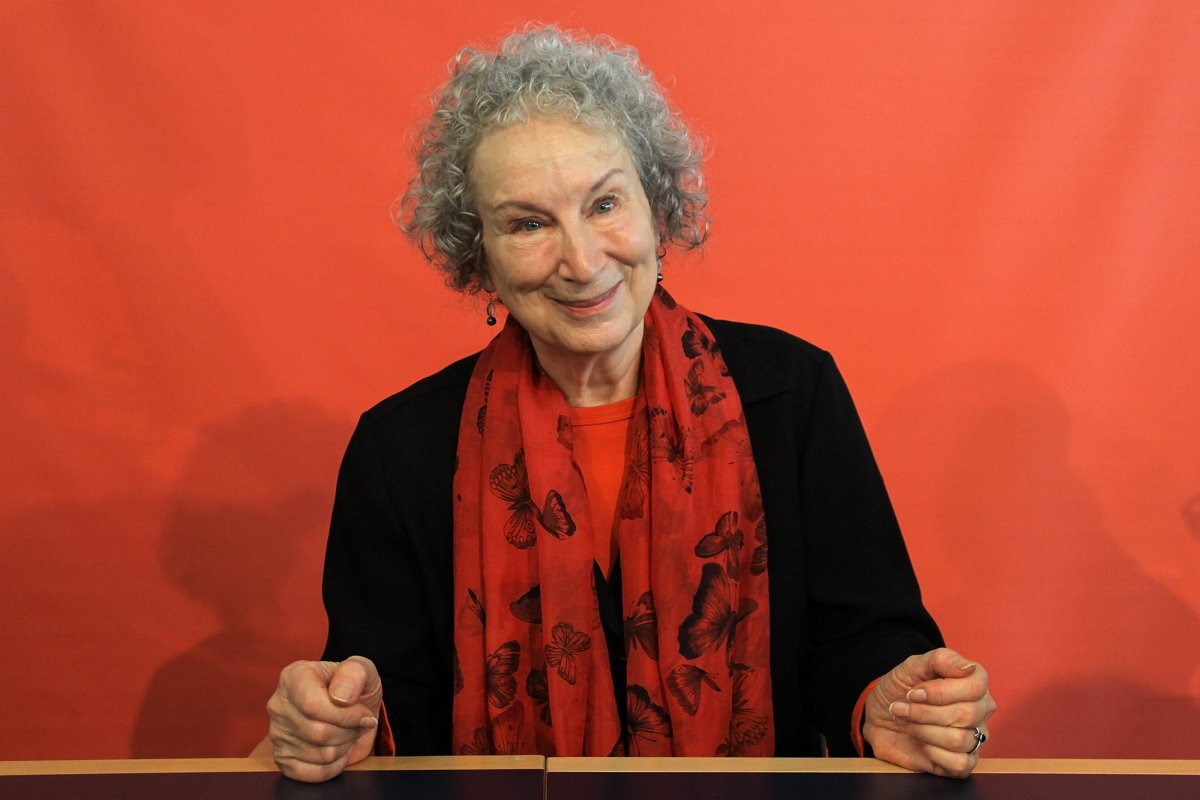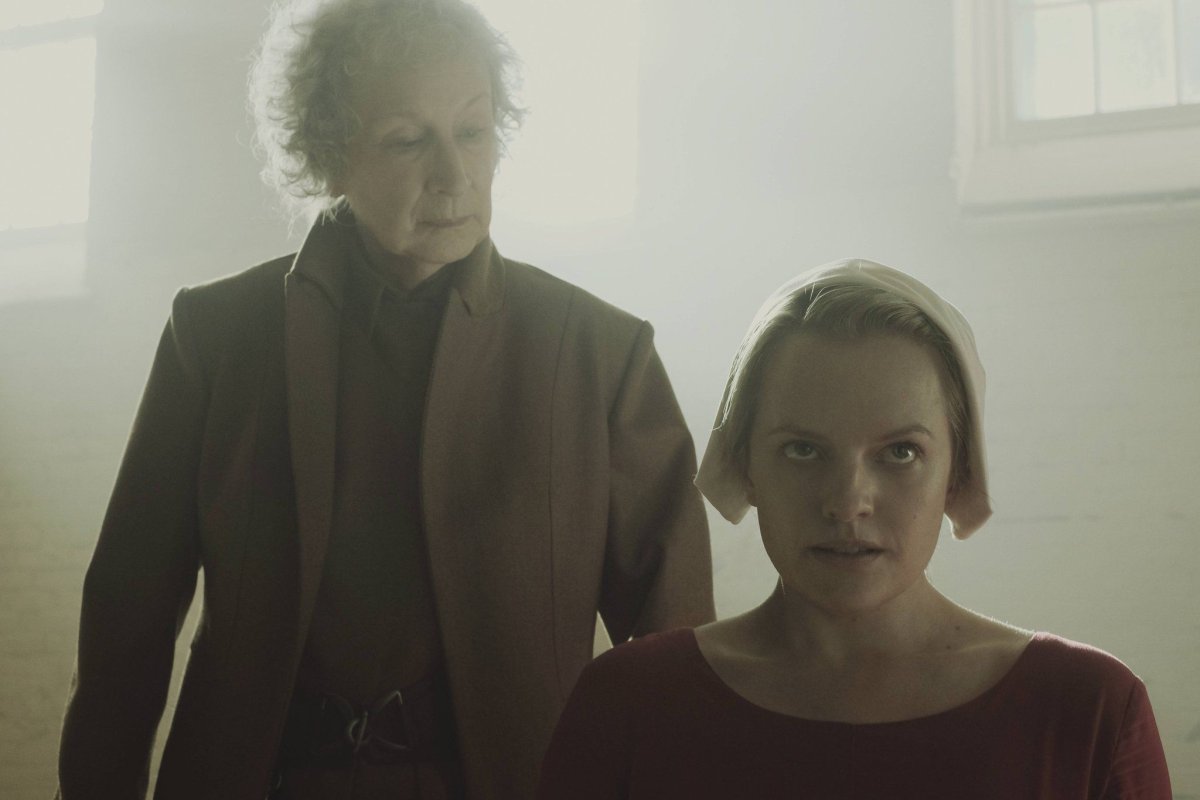When the Canadian author Margaret Atwood was writing The Handmaid's Tale in 1984, she was living in West Berlin. The Cold War had yet to thaw, and American was in the middle of Ronald Reagan's eight-year presidency. The Berlin Wall would finally topple in 1989, the same year that 600,000 abortion rights advocates marched on Washington D.C. It was a different world, though not, as it turns out, as different as one might have thought. Atwood never imagined that her speculative fiction would resonate even more profoundly today than when the book was published in 1985. She never imagined that, last May, she would see women protesting anti-abortion measures on the floor of the Texas Senate, wearing the red dresses and white-winged bonnets of her fictional handmaids. She certainly hoped that the repressed, patriarchal society in her imagined world of Gilead—based loosely on New England—would seem irrelevant in 2018.
The reality, of course, is that the Emmy-winning Hulu adaptation of The Handmaid's Tale debuted last April, to almost universal acclaim, just months after Donald Trump assumed office as president of the United States. The first season seemed to comment directly on the totalitarian and sexist impulses of the country's new commander-in-chief and administration, in large part because Bruce Miller, who adapted the book for TV, had chosen to set the dystopian tale in the present, rather than in the '80s of the book.
The show returns on Wednesday night, with the first two episodes of Season 2. Offred/June (played by Emmy- and Golden Globe-winning star Elisabeth Moss) was last seen being pushed into a mysterious van, which is how the novel ended. What happens next—and Miller says he has eight more seasons plotted out—is his creation as much as Atwood's. We know that things the novel only referred to in passing—such as "the Colonies," the labor camps where unruly, non-fertile women are sent to clean toxic waste—will be revealed. Atwood, who is 78, was a story consultant on the series. She spoke to Newsweek about her novel's impact, and America post-Trump and her anitpathy for the term "feminist."

How have conversations about The Handmaid's Tale evolved since it was published?
At first, particularly in England, it was viewed more as a speculative fiction that wasn't going to happen: "Jolly good tale, surely not." In Canada, the response was nervous: "Could it happen here?" In the States it was mixed—either "Oh Margaret, don't be silly, that was long ago! We're never going to do that again!" Or: "How long have we got?"
In the last three elections, the novel became a meme. In the first two, for Obama, it was, "[The Handmaid's Tale ] is what the Republicans want to do." Then it was, "We dodged a bullet." With Trump's election, it became, "The Handmaid's Tale is here."
Do you agree with the latter sentiment?
It's not here yet or we wouldn't be having this conversation, because you'd be in jail! [Laughs] But I'm in Canada, so maybe I'd be welcoming you at a refugee center.
What do you make of American politics?
There are two changes happening now: One is a push towards conservatism; the other is a push back against that. So American democracy is not over yet. Democracy, of course, depends on this apparition between the judiciary and the executive branch. We do notice that people are taking steps to try to protect that. The pivot is if Trump fires Mueller—what is Congress going to do then? And what are people going to do then?
You'd have to be a lunatic to predict anything! [Laughs] You really would. We've seen so many twists and turns and surprises already. We have no idea what else might be in the box.
You wrote a new introduction for The Handmaid's Tale, reprinted last year, and mentioned one of the questions you hear most often: Is The Handmaid's Tale a feminist novel? Why do you think that is?
It seems to be very worrisome to people. People seem to want—they want to ask that question. But then if you ask them, "What do you mean by feminist?" they quite frequently do not have an answer. If you go on to your browser and look at "types of feminism," you will find that there's about 50 of them. Any novel that has women at the center in the way that The Handmaid's Tale does, is going to be viewed as in some way feminist. But you'll notice that Anna Karenina has women at the center. Does that make it a feminist novel?
I think [The Handmaid's Tale] is, in that it's based on a re-interpretation of the legal system, which is decidedly restrictive to women. Also, nothing in The Handmaid's Tale is made up—all of these things have existed at one time or another. It's historically situated, and the history of the past 3,000 years has not been very feminist, to put it mildly.
Are things better or worse for women since you published the book in 1985?
These things are always push, push, push and pushback. There's been a lot of pushback, but I think there's also been a lot of push forward. You can chart the actions and the reactions. The 50s was a pushback decade for women's rights, the 40s was a push forward. The '70s was an active push forward, the '80s, when I wrote the novel, was pushback. The '90s was somewhat of a distraction because the Cold War [ended], so people were thinking a lot less about women and a lot more about what was going to happen in the new world order—were we all just going to go shopping?
What kind of decade are we in now?
One would have to be lunatic to predict anything. It's more like the '30s than anything I've lived through. There seems to be a kind of battle royale between extreme right-wing and left-wing push backers. Those kinds of divisions are more extreme now than any time that I can remember. It's partly because there is a president who is encouraging that dichotomy. I have to say, it's not good for the United States as an international power. Who's going to benefit from all of this disruption and division in the United States?

I know you've said before that The Handmaid's Tale was not predictive...
Well, it wasn't intended to be! [Laughs] It was more intended to be, "Do you want to live here? Don't go there."
Do you hope Trump and his supporters watch the series?
I think it's quite unlikely. [Laughs] But the noteworthy thing is the use of the very visual and iconic costume as a protest tool. It started in Texas, and they wanted to do it in a legislature. They went and just sat in the legislature, and it's brilliant because they're not making any noise. They can't be thrown out. They just sit there, and everybody sees that and knows what it means.
Season 2 is going beyond your novel, and I understand you're consulting with Bruce Miller on the story.
Yes, I'm a consultant, but that doesn't mean I have veto power. No one would ever give an author that—you'd be really foolish to do so. All of these shows are team efforts, and they involve a prodigious number of people. There isn't any one person in control.
What was it like to go back to these characters and imagine their stories beyond the novel?
For a television series, it makes a lot of sense. The original novel, we're hearing one point of view so that means we can't explore the lives of anybody who vanishes from the view of that one character. In the series, we can follow them and we do find out what happens to them. We're going to the colonies, for instance. We're able to see Lydia [Ann Dowd] in her moments when she's not being looked at—and Ann is a brilliant actress. They're all terrific—you couldn't ask for a better cast.
Do you have another cameo this season?
I do not have a cameo in this season. One was enough.

Bruce Miller has said that Season 2 deals more with Gilead's racial politics.
Yes, because he listens to feedback. That was one of the things people said: "We're not seeing enough of this." We always had Moira, and we always had Rita, but it wasn't foregrounded. In the original novel, [Gilead does] the South African [method of segregation] of years past. They ship people to a "national homeland"—you're told it's happening but you don't see it happening. Bruce made the decision that there would be many more multiracial relationships than there had been, since it was in the present time. June's partner is black, and that wouldn't have happened in the original novel because they were segregationists. But for the TV series, it was decided that being a fertile woman trumped race—I probably shouldn't have said "trumped."
Why did you go the segregation route originally?
Because it was in the American past very recently. Remember how old I am! I existed for quite a while before the civil rights movement. I saw it in action.
Some argue that the segregation in the novel was a way to avoid dealing with race. Any response to that?
Maybe they should read some history. Maybe they should read some of their own history. We wonder a little about some of the Marthas in the narrative—whether in the ancient American south, they would have been in trouble for being mixed-race. But so far, in the novel anyway, they've gotten away with it.
Hollywood is reckoning with sexism right now, with the #MeToo and the Time's Up movement...
I'll just throw in the #AfterMeToo movement. It's Canadian, and it's the next step of what you do—and I think it's more like Time's Up, in that it aims to provide a structural solution to some of these problems. Like where you can go safely, and also a fair process involving third-party professional investigators.
Do you feel the original movement was lacking those resources?
No, I felt the original movement happened because those resources weren't there. If there is no structural support, what else can you do? But if there is a structural support, you don't necessarily have to do [what the #MeToo movement did], which, when you come to think of it, is sometimes not very safe.
As someone who has long advocated for women's rights, what advice to you have for young feminists?
Simply stating an opinion—although it might be helpful to a degree—doesn't provide long-term structural solutions. It may be the fuel for those solutions. A person who has a very good essay on the subject is Ursula K. Le Guin, in her last book, No Time to Spare. In the essay, "About Anger," she says that anger is a symptom, and it can be a release. But if you then don't use it to affect change, it turns in upon itself and starts to fester.
There was another wonderful TV adaptation of one of your novels, Alias Grace. Will that be developed beyond the book, like The Handmaid's Tale?
No, that's done. It was a miniseries. In fact, [screenwriter and director] Sarah Polley first wrote it as a film, and then said "Would you mind awfully if I made into a six-part miniseries? There's too much in it for 90 minutes." Again, it was because the streamed mini-series was possible that she was able to do that.
Is there anything that you haven't done in your career that you would like to do?
Oh well, of course. You know, I'll never be an opera singer. Maybe in the next life.
Uncommon Knowledge
Newsweek is committed to challenging conventional wisdom and finding connections in the search for common ground.
Newsweek is committed to challenging conventional wisdom and finding connections in the search for common ground.
About the writer
Anna is a Newsweek culture writer based in New York City. Previously she was a Film/TV writer at Elite Daily and an ... Read more
To read how Newsweek uses AI as a newsroom tool, Click here.








